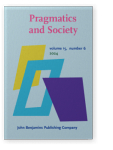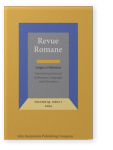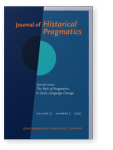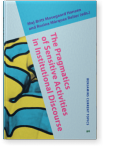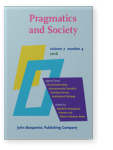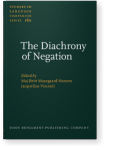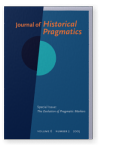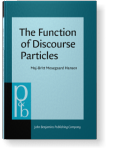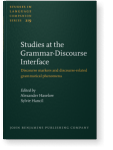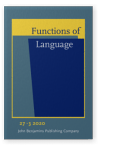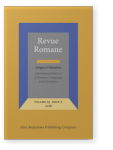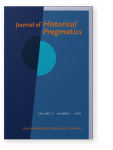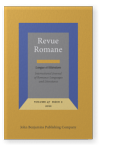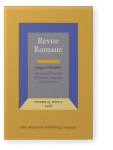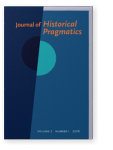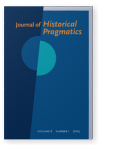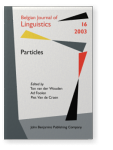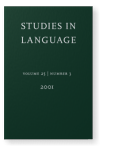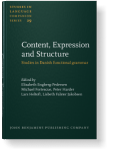Maj-Britt Mosegaard Hansen
List of John Benjamins publications for which Maj-Britt Mosegaard Hansen plays a role.
Journals
ISSN 0035-3906 | E-ISSN 1600-0811
The Role of Pragmatics in Cyclic Language Change
Edited by Maj-Britt Mosegaard Hansen
Special issue of Journal of Historical Pragmatics 21:2 (2020) v, 182 pp.
Subjects Discourse studies | Historical linguistics | Pragmatics
The Pragmatics of Sensitive Activities in Institutional Discourse
Edited by Maj-Britt Mosegaard Hansen and Rosina Márquez Reiter
[Benjamins Current Topics, 96] 2018. v, 194 pp.
Subjects Discourse studies | Pragmatics
(Co-)Constructing Interpersonally Sensitive Activities Across Institutional Settings
Edited by Maj-Britt Mosegaard Hansen and Rosina Márquez Reiter
Special issue of Pragmatics and Society 7:4 (2016) v, 186 pp.
Subjects Discourse studies | Pragmatics | Sociolinguistics and Dialectology
The Diachrony of Negation
Edited by Maj-Britt Mosegaard Hansen and Jacqueline Visconti
[Studies in Language Companion Series, 160] 2014. v, 258 pp.
Subjects Functional linguistics | Historical linguistics | Syntax | Theoretical linguistics
The Evolution of Pragmatic Markers
Edited by Maj-Britt Mosegaard Hansen and Corinne Rossari
Special issue of Journal of Historical Pragmatics 6:2 (2005) 179 pp.
Subjects Discourse studies | Historical linguistics | Pragmatics
The Function of Discourse Particles: A study with special reference to spoken standard French
Maj-Britt Mosegaard Hansen
[Pragmatics & Beyond New Series, 53] 1998. xii, 418 pp.
Subjects Discourse studies | Pragmatics | Romance linguistics | Semantics
2021 Chapter 5. The meaning and functions of French je pense (que) : A constructionalist and interactional account Studies at the Grammar-Discourse Interface: Discourse markers and discourse-related grammatical phenomena, Haselow, Alexander and Sylvie Hancil (eds.), pp. 127–156 | Chapter
This paper examines the meanings of the French construction je pense (que) (‘I think (that)’, henceforth JP), as well as its uses in social interaction. We propose an account of JP as a micro-construction with two basic elements of coded meaning, either one of which may be pragmatically… read more
2020 Introduction: The role of pragmatics in cyclic language change The Role of Pragmatics in Cyclic Language Change, Mosegaard Hansen, Maj-Britt (ed.), pp. 165–181 | Introduction
In Section 1 of my introduction to this Special Issue, I define the concept of semantic–pragmatic cycles, a relatively recently discovered phenomenon, drawing a distinction between two sub-types: onomasiological and semasiological cycles. Semantic–pragmatic cycles are contrasted with the more… read more
2020 The role of (historical) pragmatics in the use of response particles: The case of French Functions of Language 27:3, pp. 307–339 | Article
This paper studies the synchronic uses and diachronic evolution of a small set of so-called “response particles” in French, viz. the contemporary forms oui ‘yes’, si ‘yes’, and non ‘no’, and their historical sources, as well as a by now largely obsolete fourth particle nenni ‘no’. Among current… read more
2018 Patterns of thanking in the closing section of UK service calls: Marking conversational macro-structure vs managing interpersonal relations The Pragmatics of Sensitive Activities in Institutional Discourse, Mosegaard Hansen, Maj-Britt and Rosina Márquez Reiter (eds.), pp. 161–189 | Article
I investigate patterns of usage of thanking formulae in the closing section of a corpus of 94 telephone calls made by tenants to a UK housing association. The data suggest that unilateral thanking is the norm when calls are institutionally and interactionally unmarked. In contrast, mutual thanking… read more
2018 Véronique Traverso (2016). Décrire le français parlé en interaction Revue Romane 53:2, pp. 355–357 | Review
2018 Introduction The Pragmatics of Sensitive Activities in Institutional Discourse, Mosegaard Hansen, Maj-Britt and Rosina Márquez Reiter (eds.), pp. 1–5 | Article
2016 Patterns of thanking in the closing section of UK service calls: Marking conversational macro-structure vs managing interpersonal relations (Co-)Constructing Interpersonally Sensitive Activities Across Institutional Settings, Mosegaard Hansen, Maj-Britt and Rosina Márquez Reiter (eds.), pp. 664–692 | Article
I investigate patterns of usage of thanking formulae in the closing section of a corpus of 94 telephone calls made by tenants to a UK housing association. The data suggest that unilateral thanking is the norm when calls are institutionally and interactionally unmarked. In contrast, mutual thanking… read more
2016 The (co-) construction of potentially interpersonally sensitive activities across languages and institutional contexts (Co-)Constructing Interpersonally Sensitive Activities Across Institutional Settings, Mosegaard Hansen, Maj-Britt and Rosina Márquez Reiter (eds.), pp. 507–511 | Article
2014 The grammaticalization of negative indefinites: The case of the temporal/aspectual n-words plus and mais in Medieval French The Diachrony of Negation, Mosegaard Hansen, Maj-Britt and Jacqueline Visconti (eds.), pp. 185–212 | Article
This chapter traces the diachronic evolution in Medieval French of two temporal/aspectual n-words of adverbial origin, the markers mais (< Lat. MAGIS ‘more, to a greater degree’) and plus (< Lat. PLUS ‘more’), equivalent to English no more/no longer, anymore/any longer, with a view to addressing… read more
2014 The diachrony of negation: Introduction The Diachrony of Negation, Mosegaard Hansen, Maj-Britt and Jacqueline Visconti (eds.), pp. 1–12 | Article
2008 Critique de Marchello-Nizia (2006): Grammaticalisation et changement linguistique Revue Romane 43:2, pp. 356–360 | Review
2005 From prepositional phrase to hesitation marker: The semantic and pragmatic evolution of French enfin Journal of Historical Pragmatics 6:1, pp. 37–68 | Article
The adverb enfin (lit.: ‘at last’) is pragmatically highly polyfunctional in contemporary French, and previous studies disagree on its proper semantic representation. The present paper traces enfin’s diachronic development from the earliest French texts, where only the temporal, etymological sense… read more
2005 The evolution of pragmatic markers: Introduction The Evolution of Pragmatic Markers, Mosegaard Hansen, Maj-Britt and Corinne Rossari (eds.), pp. 177–187 | Article
2002 From aspectuality to discourse marking: The case of French déjà and encore Particles, Wouden, Ton van der, Ad Foolen and Piet Van de Craen (eds.), pp. 23–51 | Article
2001 Syntax in interaction: Form and function of yes/no interrogatives in spoken standard French Studies in Language 25:3, pp. 463–520 | Article
This paper investigates the correlation between the form and function of yes/no interrogatives in spoken French. The standard language possesses three ways of constructing such interrogatives: verb-clitic inversion; prefixation of a declarative sentence with the interrogative particle est-ce que;… read more
1996 Eh bien: Marker of comparison and contrast Content, Expression and Structure: Studies in Danish functional grammar, Engberg-Pedersen, Elisabeth, Michael Fortescue, Peter Harder, Lars Heltoft and Lisbeth Falster Jakobsen (eds.), pp. 315–342 | Article
